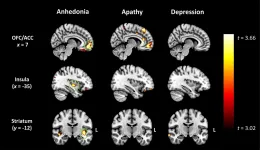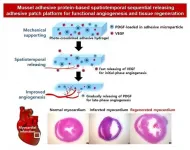Study shows young early-onset colorectal cancer patients have increased survival
2021-04-12
(Press-News.org) New research by Yale Cancer Center shows patients with early-onset colorectal cancer, age 50 and younger, have a better survival rate than patients diagnosed with the disease later in life. The study was presented virtually today at the American Association of Cancer Research (AACR) annual meeting.
"Although small, we were surprised by our findings," said En Cheng, MD, MSPH, lead author of the study from Yale Cancer Center. "Past studies have shown younger colorectal patients, those under 50, were reported to experience worse survival compared with patients diagnosed at older ages. We hope this result can be inspiring for these younger cancer patients."
Using the National Cancer Database between January 1, 2004 through December 31, 2015, overall survival of 769,871 colorectal cancer patients was assessed by the Kaplan-Meier method and Cox proportional hazards regression. The Yale investigators chose colorectal cancer patients diagnosed at ages 51-55 years as the comparison group. Early-onset colorectal patients were reported to have a modestly lower 10-year survival rate in unadjusted analysis. However, after adjusting for stage at diagnosis, early onset colorectal patients had better survival compared to subjects diagnosed at ages 51-55. The Yale researchers discovered younger patients had a 5% lower risk of death versus people diagnosed at ages 51-55, and the survival advantage appeared greatest for patients diagnosed at ages 35-39 and with cancer stages I-II. However, Cheng noted this survival advantage should be interpreted cautiously.
"More studies are needed to verify the survival advantage and to understand biological distinctiveness and heterogeneity within early-onset of colorectal cancer," added Cheng. "It also reinforces the importance of early colorectal cancer detection in the younger population."
INFORMATION:
Other Yale authors of the study include Melinda L. Irwin, PhD, MPH, Xiaomei Ma, PhD, Cary P. Gross, MD, Donna Spiegelman, ScD, Pamela L. Kunz, MD, Xavier Llor, MD, PhD, Kevin Billingsley, MD, MBA, Nita Ahuja, MD, MBA and senior author Charles S. Fuchs, MD.
About Yale Cancer Center and Smilow Cancer Hospital
Yale Cancer Center (YCC) is one of only 51 National Cancer Institute-designated comprehensive cancer centers in the nation and the only such center in Connecticut. Cancer treatment for patients is available at Smilow Cancer Hospital through 13 multidisciplinary teams and at 15 Smilow Cancer Hospital Care Centers in Connecticut and Rhode Island. Comprehensive cancer centers play a vital role in the advancement of the NCI's goal of reducing morbidity and mortality from cancer through scientific research, cancer prevention, and innovative cancer treatment.
[Attachments] See images for this press release:

ELSE PRESS RELEASES FROM THIS DATE:
2021-04-12
In a new study led by Yale Cancer Center, researchers have advanced a tumor-targeting and cell penetrating antibody that can deliver payloads to stimulate an immune response to help treat melanoma. The study was presented today at the American Association of Cancer Research (AACR) virtual annual meeting.
"Most approaches rely on direct injection into tumors of ribonucleic acids (RNAs) or other molecules to boost the immune response, but this is not practical in the clinic, especially for patients with advanced cancer," said Peter M. Glazer, MD, PhD, Chair of the Department of Therapeutic Radiology ...
2021-04-12
New research from CU Cancer Center member Scott Cramer, PhD, and his colleagues could help in the treatment of men with certain aggressive types of prostate cancer.
Published this week in the journal Molecular Cancer Research, Cramer's study specifically looks at how the loss of two specific prostate tumor-suppressing genes -- MAP3K7 and CHD1 --increases androgen receptor signaling and makes the patient more resistant to the anti-androgen therapy that is typically administered to reduce testosterone levels in prostate cancer patients.
"Doctors don't normally stratify patients based on this subtype and say, 'We're going to have to treat these people differently,' but we think this should be considered before treating ...
2021-04-12
KEY POINTS:
- Loss of pleasure has been revealed as a key feature in early-onset dementia (FTD), in contrast to Alzheimer's disease.
- Scans showed grey matter deterioration in the so-called pleasure system of the brain.
- These regions were distinct from those implicated in depression or apathy - suggesting a possible treatment target.
People with early-onset dementia are often mistaken for having depression and now Australian research has discovered the cause: a profound loss of ability to experience pleasure - for example a delicious meal or beautiful sunset - related to degeneration of 'hedonic hotspots' in the brain where pleasure mechanisms are concentrated.
The University of Sydney-led ...
2021-04-12
While the new Coronavirus will, hopefully, be effectively controlled sooner rather than later, its latest namesake is here to stay - a small caddisfly endemic to a national park in Kosovo that is new to science.
Potamophylax coronavirus was collected near a stream in the Bjeshkët e Nemuna National Park in Kosovo by a team of scientists, led by Professor Halil Ibrahimi of the University of Prishtina. After molecular and morphological analyses, it was described as a caddisfly species, new to science in the open-access, peer-reviewed Biodiversity Data Journal.
Ironically, the study of this new insect was impacted by the same pandemic that inspired its scientific name. Although it was collected a few years ago, the new species was only described during the global pandemic, ...
2021-04-12
New research shows that people who experience big dips in blood sugar levels, several hours after eating, end up feeling hungrier and consuming hundreds more calories during the day than others.
A study published today in Nature Metabolism, from PREDICT, the largest ongoing nutritional research program in the world that looks at responses to food in real life settings, the research team from King's College London and health science company ZOE (including scientists from Harvard Medical School, Harvard T.H. Chan School of Public Health, Massachusetts General Hospital, the University of Nottingham, Leeds University, and Lund University ...
2021-04-12
Between 2018 and 2020, 1,4 million EU citizens signed the petition 'End the Cage Age', with the aim of ending cage housing for farm animals in Europe. In response to this citizens initiative, the European Parliament requested a study by Utrecht University researchers on the possibilities to end cage housing. On 13 April, the scientists will present their report 'End the Cage Age - Looking for Alternatives' to the European Parliament.
In the report, behavioural biologists, animal scientists, veterinarians and ethicists from Utrecht University's Faculty of Veterinary Medicine analysed the available scientific literature on alternatives to cage housing. "Our focus was on laying hens and pigs" says Bas Rodenburg, Professor of Animal Welfare at Utrecht University. "Because these ...
2021-04-12
Many women "risk" allowing natural grey hair to show in order to feel authentic, a new study shows.
Researchers from the University of Exeter surveyed women who chose not to dye their grey hair, and found a "conflict" between looking natural and being seen as competent.
Participants in the study - mostly from English-speaking countries - belonged to online groups whose members allow their natural grey hair to show, and the researchers noted "solidarity and sisterhood" among these women.
"We are all constrained by society's norms and expectations when it comes to appearance, but expectations are more rigorous for women - especially older women," said lead author Vanessa Cecil, of the University of Exeter.
"The 'old woman' is an undesirable character in Western societies, being seen ...
2021-04-12
Why is sugar not transparent? Because light that penetrates a piece of sugar is scattered, altered and deflected in a highly complicated way. However, as a research team from TU Wien (Vienna) and Utrecht University (Netherlands) has now been able to show, there is a class of very special light waves for which this does not apply: for any specific disordered medium--such as the sugar cube you may just have put in your coffee--tailor-made light beams can be constructed that are practically not changed by this medium, but only attenuated. The light beam penetrates the medium, and a light pattern arrives on the other ...
2021-04-12
Blood vessels deliver nutrients and oxygen to each organ in our body. They are difficult to completely restore to their original conditions once damaged by myocardial infarction or severe ischemic diseases. This is because various angiogenic growth factors must be applied sequentially in order to restore the vascular structure. Recently, a research team at POSTECH has bioengineered a novel adhesive patch platform that can efficiently deliver blood vessel-forming growth factors spatiotemporally using mussel adhesive protein (MAP), a bio-adhesive material that is made from mussels harmless to humans.
A POSTECH research team led by Professor Hyung Joon ...
2021-04-12
Squirrels and other tree-dwelling rodents evolved to have bigger brains than their burrowing cousins, a study suggests.
This greater brain power has given them key abilities needed to thrive in woodland habitats, including better vision and motor skills, and improved head and eye movements, researchers say.
Scientists have shed light on how the brains of rodents - a diverse group that accounts for more than 40 per cent of all mammals - have changed since they evolved around 50 million years ago.
Few studies looking into factors affecting brain size in mammals have taken account ...
LAST 30 PRESS RELEASES:
[Press-News.org] Study shows young early-onset colorectal cancer patients have increased survival







